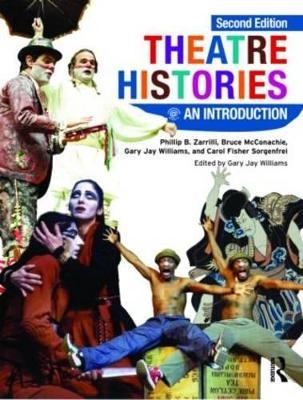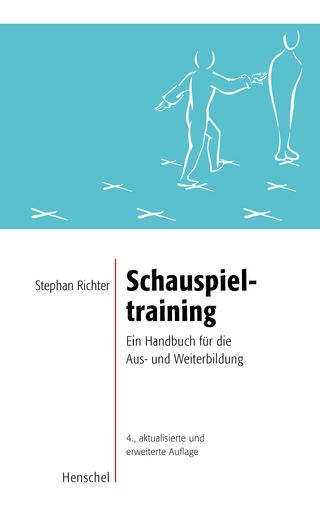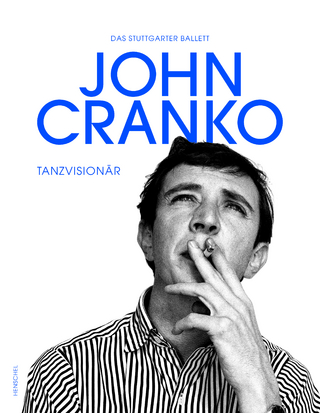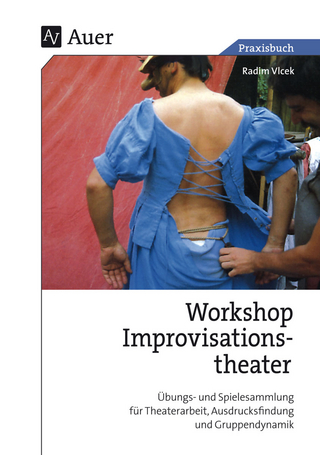
Theatre Histories
Routledge (Verlag)
978-0-415-46224-2 (ISBN)
- Titel erscheint in neuer Auflage
- Artikel merken
This new edition of the innovative and widely acclaimed Theatre Histories: An Introduction offers overviews of theatre and drama in many world cultures and periods together with case studies demonstrating the methods and interpretive approaches used by today's theatre historians.
Completely revised and renewed in color, enhancements and new material include:
a full-color text design with added timelines to each opening section
a wealth of new color illustrations to help convey the vitality of performances described
new case studies on African, Asian, and Western subjects
a new chapter on modernism, and updated and expanded chapters and part introductions
fuller definitions of terms and concepts throughout in a new glossary
a re-designed support website offering links to new audio-visual resources, expanded bibliographies, approaches to teaching theatre and performance history, discussion questions relating to case studies and an online glossary.
Phillip B. Zarrilli is Professor of Performance Practice in the Department of Drama at the University of Exeter. From 1976-1998 he was Professor of Theatre, Folklore, and South Asian Studies at the University of Wisconsin-Madison. He has also taught at U.C.L.A., Northwestern, N. Y. U. , and the University of Surrey. His books include Kathakali Dance-Drama: Where Gods and Demons Come to Play (Routledge 2000); "When the Body Becomes all Eyes": Paradigms, Practices, and Discourses of Power in Kalarippayattu, 2nd edn (Oxford University Press 2000); Acting (Re)Considered: Theories and Practices, 2nd edn (ed. Routledge 2002); Asian Martial Arts in Actor Training (ed. Madison 2003); Indian Theatre: Traditions of Performance (co-author; University of Hawaii Press 1990); Wilhelm Tell in America's Little Switzerland (co-author; Onalaska: Crescent Printing Company 1987); and The Kathakali Complex: Actor, Performance, Structure (New Delhi: Abhinav 1984). He is internationally known for training actors using a psychophysical process combining yoga and Asian martial arts, and as a director. His productions of Samuel Beckett's plays in Los Angeles, Austria, and Ireland have won considerable critical acclaim. Bruce McConachie is Chair of Theatre Arts at the University of Pittsburgh, where he also directs and performs. He has published widely in American theatre history, theatre historiography, and performance and cognitive studies. Some of his major books include: Interpreting the Theatrical Past (with Thomas Postlewait, University of Iowa Press, 1989), Melodramatic Formations: American Theatre and Society, 1820-1870 (University of Iowa Press 1992); American Theater in the Culture of the Cold War (University of Iowa Press, 2003); Performance and Cognition (with F. Elizabeth Hart, Routledge 2006); and Engaging Audiences: A Cognitive Approach to Spectating in the Theatre (Palgrave Macmillan 2008). Professor McConachie is also a former President of the American Society for Theatre Research. Gary Jay Williams is Professor Emeritus, Department of Drama, The Catholic University of America in Washington D.C., where he directed productions and taught theatre history, theory, and Shakespeare in performance for 29 years. He is the author of Moonlight Revels: A Midsummer Night's Dream in the Theatre (University of Iowa Press 1997), winner of Theatre Library Association's George Freedley Award. He was the Editor of Theatre Survey, journal of the American Society for Theatre Research from 1995 to 2001, and is the author of over fifty articles in journals, encyclopedias, and anthologies. He was a professional New York critic and a professional actor. Carol Fisher Sorgenfrei is Distinguished Professor of Theater and Performance Studies at U.C.L.A. She is a scholar, translator, playwright, and director focusing on Japanese, intercultural, and fusion theatre. She is the author of Unspeakable Acts: the Avant-Garde Theatre of Terayama Shuji and Postwar Japan (University of Hawaii Press 2005), as well as many articles in journals such as TDR, Theatre Journal, and Asian Theatre Journal, essays in books, play translations, and encyclopedia entries. Her fifteen original plays include the award-winning Medea: A No Cycle Based on the Greek Myth and the kabuki-flamenco Blood Wine, Blood Wedding. With Israeli director Zvika Serper, she created the internationally acclaimed Japanese-Israeli fusion play The Dybbuk: Between Two Worlds. She is currently a Research Fellow in the Institute for Theatre Studies at Berlin's Free University.
Authors Acknowledgements Preface: Interpreting performances and cultures
Part I: Performance and theatre in oral and written cultures before 1700 1. Oral, ritual, and shamanic performance Case studies: Yoruba ritual as "play," and "contingency" in the ritual process Intepretive approach Theories of play and improvisation Korean Shamanism and the power of speech Interpretive approach Speech act theory 2. Religious and civic festivals: Early drama and theatre in context Case studies: Classical Greek theatre: Looking at Oedipus Interpretive approach Cognitive spatial relations Christians and Moors: Medieval performance in Spain and the New World Interpretive approach Cultural hierarchy 3. Early theatre in the court, temple, and marketplace: Pleasure, power, and aesthetics Case studies: Plautus's plays: What's so funny? Interpretive approach, Part I Henri Bergson's theory of laughter Interpretive approach, Part 2 Bergson's theory in historical perspective Kuttiyattam Sanskrit theatre of India: Rasa-bhava aesthetic theory and the question of taste Interpretive approach Reception theory Case study: Kathakali dance-drama: Divine "play" and human suffering on stage Interpretive approach Ethnography and history The Silent Bell: The Japanese no play, Dôjôji Interpretive approach Feminist and gender theory, modified for medieval Japan
Part II: Theatre and print cultures, 1500-1900 4. Theatre and the state, 1600-1900 Case studies: Molière and carnival laughter Interpretive approach Mikhail M. Bakhtin’s concept of the carnivalesque Kabuki and bunraku: Mimesis and the hybrid body Interpretive approach Mimesis, hybridity, and the body Shakespearean sexuality in Twelfth Night Interpretive approach Queer theory 5. Theatres for knowledge through feeling, 1700-1900 6. Theatre, nation, and empire, 1750-1900 Case studies: Theatre iconology and the actor as icon: David Garrick Interpretive approach Cultural studies and theatre iconology Theatre and hegemony: Comparing popular melodramas Interpretive approach Cultural hegemony 6. Theatre, nation, and empire, 1750-1900 Case studies: Friedrich Schiller’s vision of aesthetic education and the German dream of a national theatre Interpretive approach Studies in national/cultural identity The Playboy riots: Nationalism in the Irish theatre Interpretive approach Cognitive linguistics
Part III: Theatre in modern media cultures, 1850-1970 7. Theatres of popular entertainment, 1850-1970 Case studies: "Blacking up" on the U.S. stage Interpretive approach Reification and utopia in popular culture British pantomime: How "bad" theatre remains popular Interpretive approach Phenomenology and history 8. Theatres of the avant-garde and their legacy, 1880-1970 Case studies: Psychological and sociological training for the actor Interpretive approach Cognitive psychology Discoursing on desire: Desire Under the Elms in the 1920s Interpretive approach Discourse theory 9. Modernism in drama and performance, 1890-1970 Case studies: Ibsen's A Doll House: If Nora were a material girl Interpretive approach Cultural materialism Modernism in Chekhov, Pirandello, and Beckett Interpretive approach Comparative analysis 10. Theatres for reform and revolution, 1880-1970 Case studies: Social drama in Kerala, India: Staging the "revolution" Interpretive approach Politics, ideology, history, and performance Brecht directs Mother Courage Interpretive approach Semiotics
Part IV: Theatre and performance in the age of global communications, 1950 to the present 11. Rich and poor theatres of globalization Case studies: The vortex of Times Square Interpretive approach Vortices of behaviour Athol Fugard: Theatre of witnessing in South Africa Interpretive approach Social justice and the artist 12. Director, text, and performance in the postmodern world Case studies: The crisis of representation and the authenticity of performance: Antonin Artaud and Jacques Derrida Interpretive approach Deconstruction Global Shakespeare Interpretive approach Postcolonial criticism 13. Interculturalism, hybridity, tourism: The performing world on new terms Case studies: Whose Mahabharata is it anyway? The ethics and aesthetics of intercultural performance Interpretive approach The historian between two views of intercultural performance Imagining contemporary China: Gao Xingjian’s Wild Man in post-Cultural Revolution China Interpretive approach Theories of national identity Backstage/frontstage: Ethnic tourist performances and identity in "America’s Little Switzerland" Interpretive approach Sociological theories of tourism and everyday performance Glossary Index
| Zusatzinfo | 9 Line drawings, black and white; 157 Halftones, black and white; 166 Illustrations, black and white |
|---|---|
| Verlagsort | London |
| Sprache | englisch |
| Maße | 189 x 246 mm |
| Gewicht | 1406 g |
| Themenwelt | Kunst / Musik / Theater ► Theater / Ballett |
| Geisteswissenschaften ► Geschichte | |
| ISBN-10 | 0-415-46224-X / 041546224X |
| ISBN-13 | 978-0-415-46224-2 / 9780415462242 |
| Zustand | Neuware |
| Informationen gemäß Produktsicherheitsverordnung (GPSR) | |
| Haben Sie eine Frage zum Produkt? |
aus dem Bereich



